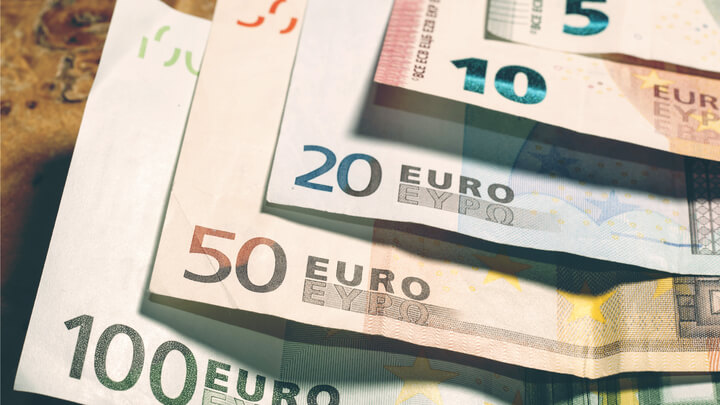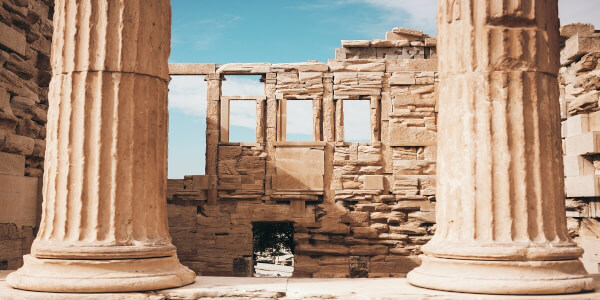VAT refund in Greece: A complete guide to tax-free shopping in Greece for tourists
Greece is just a flight away. Learn how to shop tax-free and obtain a VAT refund in cities like Athens and Santorini as a tourist.

Greece seemingly has everything you could want from a trip abroad. Breathtakingly beautiful beaches, ancient ruins, fantastic cuisine, and a rich cultural heritage - you’re going to love it.
But whether you’re staying for a few weeks or moving there permanently, you’ll need to get to grips with Greece’s currency.
Read on for everything you need to know about money and banking systems in Greece. This includes tips on currency exchange, Greek banks and the smartest way to spend during your trip.
The currency in Greece is the euro, as it is part of the eurozone.
The drachma was the primary currency of Greece until 2002, when it was replaced by the euro.
To find out how many euros you can get for your pounds (and vice versa), use our currency converter.
Here are a handful of useful-to-know facts about the euro in Greece:
If you’re visiting Greece from the UK, you’ll need to find the best way to exchange your pounds for euros - and get the best deal.
Euros are widely available at currency exchange offices throughout the world. The offered exchange rates will vary, but whether you exchange your cash at home or in Greece, you’ll still need to shop around for a good exchange rate.
To get the most EUR for your GBP, and make your holiday budget go further, follow these top tips for exchanging currency in Greece:
To help you choose a currency exchange service, make sure you first understand the mid market exchange rate. This is the one that banks and other currency services use to create their own exchange rates.
The rate constantly fluctuates, but you can find the latest mid-market rates online with a currency converter. That way, you can compare the exchange rate you’re being offered as a tourist with the mid-market rate.
The difference between the mid-market and the tourist rate is the profit margin the exchange service has added. ‘Zero commission’ and ‘No fees’ services are usually works of fiction. This is because exchange services nearly always build profit into the exchange rates they offer you. Wise fees are transparent, so there are no hidden fees*.
Check out the current conversion rate below.
If you need euros when you get to Greece, you can exchange a small amount at most of the country’s airports. However, if you’re heading to one of the more remote islands, make sure to check the exchange desk’s opening hours in advance.
Just remember that the rates you’ll get at airports and hotels probably won’t be the best in town - and there may be fees attached. So despite the convenience, it’s best avoided.
If you’re really stuck, exchange only a small amount and then seek a better deal elsewhere.
Finding places to exchange currency in large cities in Greece will be easy enough. However, if you’re heading off to rural areas or the smaller islands, it could be trickier, and more expensive.
So, it’s best to have some euros on you, or to use an ATM to withdraw cash at your destination.
It’s also worth noting that banks have extremely limited opening hours in Greece. Most will shut by 14:30 Monday to Thursday, by 14:00 on a Friday and remain closed entirely all weekend.2
If you’re travelling with foreign currency to exchange when you arrive in Greece, make sure your banknotes are clean and crisp.
Exchange services don’t like to take damaged notes and may refuse to exchange them for you.
Major card providers such as Visa and Mastercard are generally accepted in larger cities and tourist areas in Greece. If you’re in more remote areas, you might find that retailers don’t take American Express.
However, when you make it to truly rural Greece, you may find that cash is the only acceptable form of payment. It’s always best to carry some euros, just in case!
If given the choice to pay in the local currency (EUR) or your home currency (GBP), always choose the local currency. Otherwise, the payment operator gets to choose the exchange rate, and it’ll usually have an expensive mark-up built in.
If using your UK debit card abroad, make sure to tell your bank you’ll be away - just in case your overseas transactions are flagged as fraud. And check whether your bank charges any foreign transaction fees.
If so, consider an alternative such as the Wise card. It can be used in 150+ countries, including Greece, and has no foreign transaction fees*.
Even better, it automatically converts the currency locally at the mid-market exchange rate whenever you spend, for just a small conversion fee*.
And if you’re thinking about opening an account in Greece, the Wise account could be a convenient and money-saving alternative.
Learn more about the Wise account
You’ll find ATMs in Greece located in most towns, cities and tourist areas, including on the islands. But if you’re headed somewhere more remote, use one of the locator tools below to check there will be one you can use at your destination
It’s also worth asking your home bank if they have a branch where you’re headed, or have any partnerships with banks operating in the area. If they do, then you might be able to use ATMs for cheap or free cash withdrawals during your stay.
If you do need the services of a bank while in Greece, here are some of the biggest and most popular Greek banks to choose from:
See a full list of banks in Greece here.
If you’re looking to open up a bank account in Greece, a couple of the most expat-friendly banks to check out include:
A bank isn’t the only way to manage your money in a new country. You could find it easier and even cheaper to use an alternative such as Wise.
Open a Wise multi-currency account and you can hold, send, spend, receive and convert money in a whopping 40 currencies at once - and all online.
You can also send money back to the UK and worldwide for mid-market exchange rates and a low fee*.
There’s even an international debit card for spending in 150+ countries, including Greece. It automatically converts your money to the local currency at the mid-market exchange rate, whenever you spend.
Plus, you can keep track of it all on the move using the handy Wise app.
Greece used to have a fully cash-based economy, but use of debit and credit cards has grown steadily over the last few years. Despite this, cash payments are extremely common and cash is universally accepted across the country.
Traveller’s cheques aren’t commonly used in Greece. This is the case worldwide, as they’re seen as an outdated and inconvenient source of travel money.
You should still be able to cash them at one of the major banks in Greece, but some may be reluctant if you don’t have an account there.
You should also make sure the cheque is in euros, or you’ll face high fees.
The Drachma was the currency of Greece until 2002, when it was replaced by the euro.
You can take up to €10,000 EUR into Greece when travelling from the UK, without having to make a declaration to customs authorities.3
Most travellers prefer to have several different means of payment for their trip, splitting their cash across both hard currency and cards.
If you’re staying in a rural area or remote island, it’s a good idea to take euros in cash with you - just in case you can’t find an ATM or cards aren’t accepted.
Sources used for this article:
Sources checked on 10-04-2024.
*Please see terms of use and product availability for your region or visit Wise fees and pricing for the most up to date pricing and fee information.
This publication is provided for general information purposes and does not constitute legal, tax or other professional advice from Wise Payments Limited or its subsidiaries and its affiliates, and it is not intended as a substitute for obtaining advice from a financial advisor or any other professional.
We make no representations, warranties or guarantees, whether expressed or implied, that the content in the publication is accurate, complete or up to date.

Greece is just a flight away. Learn how to shop tax-free and obtain a VAT refund in cities like Athens and Santorini as a tourist.

Paying with cash or card in Greece? Read our handy guide on the best ways to pay in Greece and how to spend like a local.

Dreaming of working abroad? If you’re self-employed or a freelancer, all you need is an internet connection - and the world is your oyster. Of all the places...

Read our essential guide to ATMs in Greece, including how to find them, fees, exchange rates, withdrawal limits and more.

How much cash can I take out of Greece? Read this handy guide for everything you need to know about taking cash in and out of Greece.

Although Greece has seen economic uncertainty over the past few years, an impressive number of visitors are still drawn there every year. A record of 23.5...